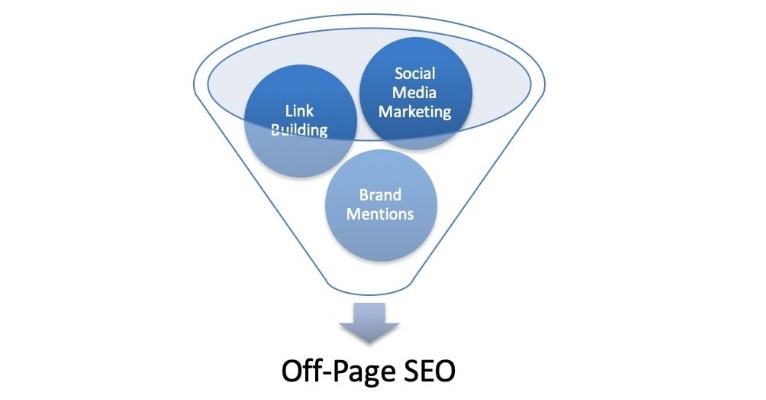The Importance of Off-Page SEO

OFF-PAGE SEO
On-page SEO are all the things that you directly control on your website, such as: content, title tags, keyword usage, SEO-optimized URLs, internal links and image alt text.
Off-page SEO are those actions that happen away from your website, such as backlinks, mentions on other websites, Google and other source customer reviews, etc. It’s no secret that off-page SEO is important for SERP, but most companies focus solely on backlinks on and yet do not realize there is so much more to off-page SEO.
In short, Off-page SEO are those activities done off your website in an effort to increase your SERP. Common off-page SEO actions include backlinks, encouraging branded searches, getting reviews and growing customer engagement on social media. Boiled down, off-page SEO are the things that you do off your website to get Google, Bing and other search engines to recognize and acknowledge your website as trustworthy and authoritative.
BACKLINKS
Backlinks and other off-site signals still form the foundation of Google’s algorithm. When it comes to off-page SEO, backlinks are THE MOST IMPORTANT. Building backlinks for off-page SEO is entirely about quality over quantity, and if you want the links you build to actually boost your rankings in the SERPs, they need to be authoritative and trusted backlinks from related sites.
That said: links are only one part of off-page SEO. Google themselves state that they use other off-site SEO signals to size up your website
(see: https://webmasters.googleblog.com/2019/08/core-updates.html).
Here are some other VIP things you can do to improve your websites offline SEO.
REPUTATION MANAGEMENT
For example, Google’s Quality Rater Guidelines largely relies on a site’s off-site reputation to figure out whether or not that site can be trusted. They call this “Reputation Research”, which includes looking at online reviews: “We consider a large number of positive user reviews as evidence of positive reputation.”
RECOMMENDATIONS & MENTIONS FROM EXPERTS
“Recommendations from expert sources, such as professional societies, are strong evidence of a very positive reputation.”
Quality News Source websites, Wikipedia, etc.
BRAND SIGNALS
Brand Signals are what Google uses to see if your website is an authentic brand, or as Google’s Eric Schmidt stated: “Brands are the solution, not the problem. Brands are how you sort out the cesspool.”
DOUBLE DOWN ON YOUTUBE
YouTube marketing is one of the best ways to boost your site’s Brand Signals. Especially branded searches. Why? Two reasons: First, your videos can get in front of A LOT of people.
Second, a lot of the people that see your videos will search for your brand on Google. That’s because YouTube doesn’t make it easy for people to visit your site from YouTube.
PUBLISH RESEARCH BACKED CONTENT
Research-backed content can directly help your off-page SEO by sending high-quality links your way.
SOCIAL ENGAGEMENT
Even though social media signals (reviews, likes, shares, votes, pins, or links) don’t have a direct impact on search rankings, they do affect your SEO in four ways:
1. Increased online visibility and traffic to your website
2. Increased authority and brand recognition
3. Broader content distribution and longer content lifespan
4. Improved local SEO (NAP)
In a nutshell, social sharing will indirectly help your off-page SEO.
And guess what? Google pulls reviews from other social sites like Facebook, Twitter, etc.
ONLINE CUSTOMER REVIEWS
Google’s Quality Rater guidelines put a lot of emphasis on online reviews. Makes sense, if people hate your business, why would Google want to show your site to more people? if you run a local business, you probably already know that reviews are very important for local SEO.
Thus, excellent customer reviews are a huge factor in local SEO marketing. Simply put, Google (and other search engines like Yahoo and Bing) like reviews. In fact, reviews account for 13 percent of ranking factors for local searches, and seven percent for general searches (Mozilla Firefox).
At the end of the day, SEO is holistic approach combining both on and off-page activities. While most companies focus on keywords and other on page elements, those companies that want to be positioned for long-term competitive advantage online will pro-actively engage activities that boost both on page and off page success.
